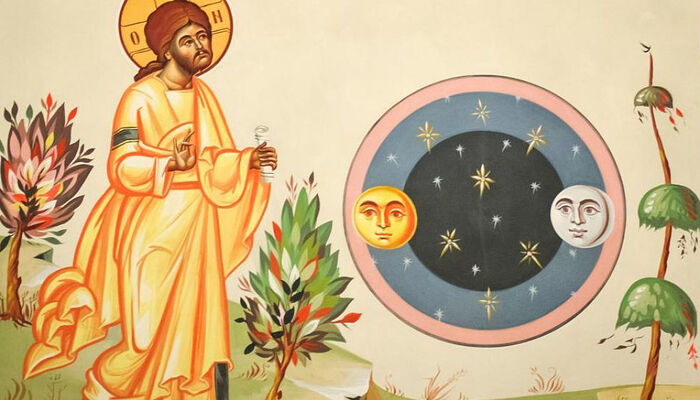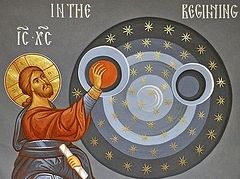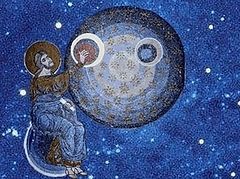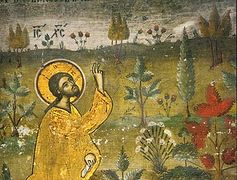Author's introduction:
This article is a chapter taken from the thesis that I wrote for the Masters of Divinity program at St. Tikhon’s Orthodox Theological Seminary under the guidance of Dr. Christopher Veniamin, a spiritual child of the great St. Sophrony of Essex, A Patristic Perspective On a Crucified Mind: Fr. Seraphim (Rose) and the Doctrine of Creation. The thesis is an examination of Fr. Seraphim’s teachings on the Church’s interpretation of the book of Genesis, most of which was presented posthumously in Genesis, Creation, and Early Man, with supplementary research. Though it has been more than 40 years since Fr. Seraphim presented his material, it remains as relevant and as true as ever. Though possessed of a brilliant mind, Fr. Seraphim chose to crucify that mind to the mind of Christ in the Church, thus his teaching is simply that of the Church, harmoniously taught by the saints for 2,000 years. This present article is the second chapter of my thesis.—Jesse Dominick
***
One of, if not the most substantial contribution that Fr. Seraphim has made to twentieth and twenty-first century Orthodoxy is his treatment of the highly-debated Creation/evolution question. Fr. Seraphim addressed this issue in writing, including personal letters, and through public lectures over the course of nine years, until his repose in 1982. Much of his output was posthumously compiled, edited, and published by the St. Herman of Alaska Brotherhood under the title of Genesis, Creation, and Early Man: The Orthodox Christian Vision (2000, 2011),[1] which has received a varied response within the American Orthodox community. Several letters addressing the issue can also be found in Fr. Alexey Young’s (now the aforementioned Hieroschemamonk Ambrose) compilation Letters from Father Seraphim. Additionally, evolution is discussed in his Orthodoxy and the Religion of the Future, and he also translated several homilies of St. Symeon the New Theologian dealing with the Creation, the Fall, and the awaited restoration of the cosmos, originally published by the St. Herman’s Brotherhood as The Sin of Adam and Our Redemption in 1979, and now published as The First-Created Man.
Fr. Seraphim was initially prompted to address the issue following the publication of an article critiquing evolution in the small journal of his spiritual child Alexey Young, Nikodemos (vol. 2, #2, March–April 1973).[2] He and Fr. Herman were surprised to receive a letter from a priest of the Russian Church Abroad under the spiritual direction of the Holy Transfiguration Monastery in Brookline, MA (which was at that time within the ROCOR jurisdiction), who objected strongly to Alexey’s article. This was later followed by a nationally circulated open letter from monks of the monastery itself. The fathers of the monastery considered evolution to be an unassailable fact and any discussion of the issue to be inappropriate. Of more concern than this objection was the manner in which the fathers of the monastery and those under their spiritual direction objected. Alexey and his journal were slandered and subscriptions were withdrawn.[3] As Fr. Seraphim writes: “They had formed a political party within [the] Church, and those who do not agree with the ‘party line’ are dismissed and regarded as non-existent, and people are even warned about the ‘dangers’ of having contact with such ones.”[4]
Fr. Seraphim was also taken aback by the seeming ignorance of the dangers of evolutionism amongst so many in the Orthodox Church—both clergy and laity. He himself had once believed “entirely” in evolution because it had always been presented as irrefutable fact to which every learned person gives assent, but upon deeper thinking he had begun to distinguish between scientific facts and scientific philosophy, concluding that evolution is actually an example of the latter.[5] In his extensive research for his shelved project The Kingdom of Man and the Kingdom of God, Fr. Seraphim traced the development of the apostasy of the western world from the truth of Orthodox Christianity and found a form of chiliasm to be the undergirding philosophy. For Fr. Seraphim, this term indicates not necessarily the strict meaning of a belief in a literal millennial reign of Christ on earth, but in a broader sense that “history is to reach its culmination in an indefinite state of earthly blessedness, a perfected mankind living in perfect peace and harmony.”[6] Archimandrite Sophrony also takes note of this as a pervading philosophy: “The tragedy of our times lies in our almost complete unawareness, or unmindfulness, that there are two kingdoms, the temporal and eternal. We would build the Kingdom of Heaven on earth, rejecting all idea of resurrection or eternity. Resurrection is a myth, God is dead.”[7] In this light, Fr. Seraphim found that the foundations for evolution had been laid by philosophy long before there was any scientific “evidence” in favor of it, and that evolution itself constitutes a philosophy,[8] one that comprises a “rival thought-pattern to Orthodoxy.”[9] The highly-respected traditional Orthodox author Dr. Constantine Cavarnos (1918-2011), who earned his PhD. in philosophy from Harvard, founded the Institute for Byzantine and Modern Greek Studies, and ended his days as a schemamonk of St. Anthony’s Monastery in Florence, AZ, strongly argues the same in his lecture Biological Evolutionism. Having majored in biology and philosophy he found that “the theories of biological evolution are philosophical in nature and should be treated as such.”[10]
Having undertaken in-depth studies of the movement of apostasy, Eugene’s knowledge was later supplemented with the theological truths of Orthodoxy through a three-year course offered by the great wonderworker St. John Maximovitch and those chosen by him, which Fr. Herman believes St. John designed specifically for Eugene. Among several other courses, St. John’s faithful priest Fr. Leonid Upshinsky presented from several Patristic commentaries on the first several chapters of Genesis. Eugene eventually graduated at the top of the class.[11] Following his conversion to Christ, he saw evolution as part of the American intellectual baggage which he was called to leave behind as he submitted his mind to the wisdom of the Church,[12] and so he was genuinely taken aback by Orthodox Christians who either fully and uncritically accepted evolutionism or did not believe it to be an important issue.[13] According to the teaching of St. Gregory Palamas (1296–1359), the archbishop of Thessaloniki, secular knowledge, including history, science, logic, and so forth, can be either good or evil according to the purpose of those who use it, and so for Fr. Seraphim, simple acceptance of the theory of evolution was not an option.[14] Following the controversy surrounding Alexey Young’s article, Fr. Seraphim made his own in-depth study of Patristic commentaries on Genesis, and of the theory of evolution.[15] He found that, despite common claims to the contrary, the Church has handed down a wealth of harmonious teaching on Creation, the first-created world, the first-created man, the Fall of man, and so forth.
The importance of Fr. Seraphim’s work, the bulk of which was originally presented as a series of lectures at the “New Valaam Theological Academy” pilgrimages at St. Herman’s Monastery in the summers of 1981 and 1982, is that it was the first, and remains the only Orthodox work in English to present an in-depth and detailed look at Genesis specifically in the Creation/evolution context, with the aim of presenting and upholding the Patristic teaching.[16] In looking to the Fathers, Fr. Seraphim was adhering to an essential principle of Orthodox hermeneutics: one must live according to the Scripture in order to understand them. One’s ability to interpret the Scriptures depends on one’s spiritual state, for the Scriptures themselves are the product of Divine inspiration. In his essay “How to Read the Bible and Why” the great Serbian luminary of modern times, St. Justin Popovich (1894-1979), writes: “It is a book that must be read with life—by putting it into practice. One should first live it, and then understand it,”[17] and Fr. Seraphim writes in his own guide to reading the Scriptures: “For our reading of Scripture to be fruitful, to help save our souls, we must ourselves be leading a spiritual life in accordance with the Gospel. The Scripture are addressed precisely to those who are trying to lead a spiritual life.”[18]
One of the major themes of Fr. Seraphim’s work on Genesis is that the first-created world, as it existed before the Fall of man, was radically different from what we know today, and so cannot be investigated through modern science, but rather is only known to man as revealed by the Saints who taught from experience and Divine vision. To Dr. Alexander Kalomiros[19] (1931-1993), a Greek medical doctor and author of the well-known work against ecumenism, Against False Union, and the controversial talk, The River of Fire, he wrote:
The interpretation of the Divinely inspired Scripture is clearly the work of God-bearing theologians, not of natural scientists, who ordinarily do not know the very first principles of such interpretation … The state of Adam and the first-created world has been placed forever beyond the knowledge of science by the barrier of Adam’s transgression, which changed the very nature of Adam and the creation, and indeed the nature of knowledge itself (emphasis in original).[20]
Fr. John Romanides (1927–2001), a prominent priest and theologian of the Greek Orthodox Archdiocese of America and the Church of Greece, taught the same in his Ancestral Sin:
If we begin with philosophical and scientific observations of the material world, it is logically impossible to arrive at a distinction between the creation of the world and its fall. Quite simply, this is because the reality before our eyes presents nature as it is now, after the fall … it is impossible for natural man to distinguish between the wholly positive creation of the world and the fall of the world. Man cannot know this division except by revelation.[21]
Thus, any attempted scientific investigation into the creation of the world and the time before man’s sin necessitates the assuming away of the once paradisaical world, and the subsequent Fall. Thus, as this work attempts to demonstrate, in order to “harmonize” this “science” with Orthodox Patristic theology, one or the other or both must be seriously compromised.
Fr. Seraphim’s conclusions about obtaining knowledge of the prelapsarian world were not simply his own, but in this he was harmonious with the Fathers of the Church, who spoke quite explicitly. St. Theophilus, a second century (c. 120–190) successor to St. Peter the Apostle at the See of Antioch and early apologist, writes: “Of this six days' work no man can give a worthy explanation and description of all its parts,” even though he had ten thousand years to speak of it, “not even so could he utter anything worthy of these things, on account of the exceeding greatness and riches of the wisdom of God which there is in the six days' work,” “but it is a succinct account of it which holy Scripture gives.”[22] St. Ambrose, the fourth century (c. 340-397) bishop of Milan, well known for baptizing St. Augustine of Hippo, in his Paradise cautions us to humility:
we are unable, owing to human weakness, yet to know and understand the reason for the creation of each and every object. Let us, therefore, not criticize in holy Scripture something which we cannot comprehend. There are very many things which must not be subjected to the judgment of our intellect. Rather, these should be surveyed from the lofty heights of Divine Providence and from the intentions of God Himself,[23]
which is accomplished within Christ’s Church through union and communion with Him.
Thus, Orthodox interpretation of Genesis follows that of the Fathers, who experienced visions of Creation, and even greater, a vision of and union with the Risen and glorified Christ. Fr. Seraphim quotes the Ninevite bishop St. Isaac the Syrian (d. c. 700) speaking of such vision: “And from this one is already exalted in his mind to that which preceded the composition of the world, when there was no creature, nor heaven, nor earth, nor angels, nothing of that which was brought into being, and to how God, solely by His good will, suddenly brought everything from non-being into being, and everything stood before Him in perfection.”[24] He also refers to St. Gregory the Sinaite (c. 1265-1346), the hesychastic contemporary of St. Gregory Palamas, who in his On Commandments and Doctrines 130 enumerates eight principal forms of contemplation, the third of which is “the composition of visible things.” Asking why this is included among other purely theological contemplations, Fr. Seraphim answers: “Is it not because there is an aspect and state of creatures beyond the sphere of scientific knowledge …?” (emphasis in original).[25] This theology corresponds to that of the earlier and inestimable giant of Orthodoxy, St. Maximus the Confessor (c. 580-662), who wrote of contemplating the logoi, “the intelligible model (λόγος) according to which things have been made.”[26] He writes that the one who is engaged in this “natural contemplation” comes to understand the God-given purpose for His creation, and seeks out the cause itself—that is, Christ,[27] and so the Saint has a greater and deeper understanding of creation than is possible from scientific studies.[28] And in fact, Archimandrite Zacharias (1946- ), the spiritual child of Elder Sophrony and spiritual grandchild of St. Silouan, writes that all of modern science is the result of Medieval monks who, suffering from despondency, forsook prayer and pursued worldly knowledge.[29] But speaking of the fruit of prayerful visions, St. Silouan writes that “The Saints speak of that which they have indeed seen and know. They do not speak of what they have not seen. The Saints say naught of their own devising.”[30] And even nearer to our own times St. Nikolai Velimirović (1880-1956) the bishop of Žiča, writes of noetic vision: “For human understanding and human logic, however great they may be, are too puny to reach to the world’s beginning and its end. Understanding is useless where vision is needed.”[31]
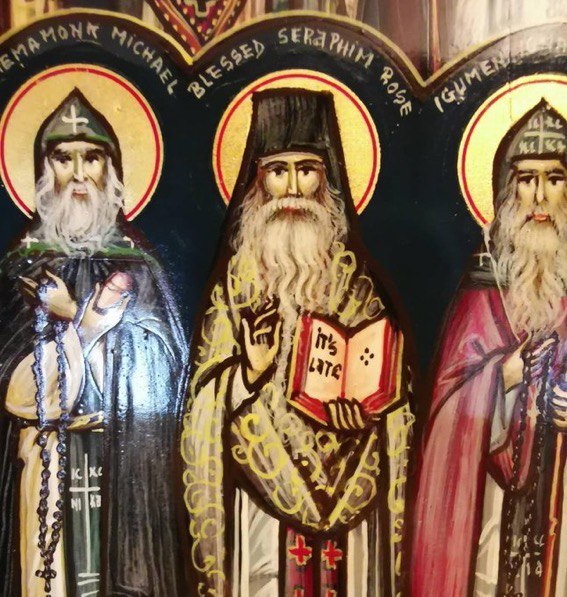 Icon of Fr. Seraphim at a church in Hong Kong
Icon of Fr. Seraphim at a church in Hong Kong
Although the great Fathers of the Church were highly educated and understood the value of secular education, St. Basil (c. 330-379), the bishop of Neo-Caesarea known as “the Great,” one of the Three Holy Hierarchs,[32] and the author of an Hexaemeron which is widely considered the Church’s classic text on the six days of Creation, declares, as Fr. Seraphim quotes: “We are proposing to examine the structure of the world and to contemplate the whole universe, beginning not from the wisdom of the world, but from what God taught His servant when He spoke to him in person and without riddles” (emphasis in Fr. Seraphim).[33] Thus, Metropolitan Hierotheos Vlachos of Nafpaktos (1945- ), a distinguished theologian of the Greek Church, can declare in his The Person in the Orthodox Tradition that St. Basil the Great did not simply accept any scientific theory of his day, but rather judged all theories by the criteria of theology[34] - a principle which was earlier stated by St. Theophan the Recluse (1815–1894), the bishop of Tambov and giant of nineteenth century Russian Orthodoxy. He writes: “The positive teaching of the Church serves to know whether a concept is from the Truth. This is a litmus test for all teachings. Whatever agrees with it, you should accept it, whatever does not—reject. One can do it without further deliberations,” and, "Science goes forward fast, let it do so. But if they infer something inconsistent with the Divine Revelation, they are definitely off the right path in life, do not follow them.”[35] Likewise, St. Gregory Palamas points to the authoritative source: “Furthermore, we see none of the first writers on any subject whatever surpassing the account of the beginning of the world and of time, as Moses recorded it.”[36] Therefore it is not accurate to say that the Fathers’ interpretations of Genesis were simply limited by their primitive scientific knowledge, because they openly profess that it was not to science and human reasoning which they looked for their understanding of the acts of God recorded in Genesis, and, as will be seen, their interpretations are often, in fact, in direct contrast to our everyday experience of the fallen world which science investigates. If the Fathers’ interpretation of Genesis is in fact limited by the science of their day, then they were not even aware of wherefrom they derived their beliefs, having confused science with theology.
Because he had personally experienced the dregs of the twentieth century “intellectual” life and because he had willingly crucified his keen mind before the mind of the Church, Fr. Seraphim was able to accept and follow the Patristic interpretations of the book of Genesis, regardless of how they compared to modern scientific theories. But although he understood the snares of fallen human reason and wisdom, it is important to note that he did not go to the extreme of being anti-intellectual, or anti-science, as is often accused of those who oppose the theory of evolution. Solomonia Nelson, who worked at St. Herman’s Monastery daily for several years in the mid-1970’s—early 1980’s, has emphasized that, although he crucified his mind, he did not obliterate it. He loved his work and he loved his research, to which he applied the strength of his mind,[37] and Hieroschemamonk Ambrose (Fr. Alexey Young) concurs: “He was by no means anti-intellectual at all—a very cultured, very refined man.”[38] Fr. Seraphim himself states: “let us remember that God is the Author of all truth, and anything genuinely true in Scripture cannot contradict anything that is genuinely true in science,”[39] but he is rightly cautious in applying modern science to the Divine Scriptures: “If we ourselves think we can add something to the understanding of the text for our days (perhaps based on the findings of modern science), let it be done cautiously and with full respect for the integrity of the text of Genesis and the opinions of the Holy Fathers,” and he continues, “And we should always be humble in this attempt—the science of our own days also has its fallings and mistakes, and if we rely too much on it we may find ourselves with wrong understandings.”[40] Here he is in accord with the method of St. Basil the Great and the principle articulated by St. Theophan the Recluse.
Fr. Seraphim began by addressing “why” we should study Genesis, and “how” to approach it. To those who question why we should think about the beginning and end of creation, he answers that our behavior is directly linked to our understanding of our origins, and our behavior reveals our desire or lack thereof for salvation and eternal life, to which Genesis, as a book of Scripture, points us. Here he references a homily of Fr. George Calciu (1925–2006), a Romanian confessor who suffered for many years in Communist gulags, in which he talks about the Communists teaching that men are descended from apes in order to justify treating one another as animals. This had been foreseen by St. Barsanuphius of Optina (1845–1913) who wrote that Darwin’s idea of survival of the fittest “is already the beginning of a bestial philosophy, and those who come to believe in it wouldn't think twice about killing a man, assaulting a woman, or robbing their closest friend -- and they would do all this calmly, with a full recognition of their right to commit these crimes.”[41] Likewise, Archimandrite Sophrony writes: “To conduct our lives fittingly, it is of cardinal importance to know that before the very creation of the world we were intended to be perfect. To belittle God’s initial idea for us is not just mistaken: it is a sin. Because we do not see in ourselves, and still less in our fellow men, any permanent virtue, we behave towards each other like jungle beasts.”[42] Furthermore, Fr. Seraphim writes that a vague understanding of the future age of blessedness, leaving men open to chiliastic theories of a “paradise on earth,” is due in large part to a poor understanding of the origin of man and the universe.[43]
Regarding “how” to approach Genesis, Fr. Seraphim urges the reader to approach with humility and, as far as is possible, without bias towards any particular scientific theory—we ought to come to the text simply seeking what it has to teach us and not looking to justify our preconceived notions. He dismisses, as not taking the text of Genesis seriously, the view that religion and science are working within two wholly separate spheres and thus have no impact or implications for one another.[44] Such a notion would betray a certain dualism that Orthodoxy has never accepted, for the body of man, and indeed all of creation, is intended to be a vessel for grace, which transfigures the physical creation, and so to properly understand the corporeal creation necessitates also an understanding of the incorporeal creation. In the aftermath of Darwin’s The Descent of Man, the great and holy luminary St. Nektarios (1846-1920), the Metropolitan of Pentapolis, wrote:
The onesided inquiry of the body [seen in the evolutionist theory] can lead to very imperfect and erroneous conclusions, which differ little from superficial observation. In order to be known, man must be examined in depth, not on the surface. We must come to know his spiritual powers, his spiritual life, his way of life, his relations to the universe and to his Creator. We must examine the purpose of his appearance in the world, his destiny. In this manner we shall be able to know him according to his dignity, in this manner we shall be able to make declarations about him.[45]
Speaking of this connection, Archimandrite Zacharias of Essex writes: “In the primordial state before the Fall, God fed the spirit of man, and the spirit of man fed his soul, and the soul passed the energy of God even to the body.”[46] Following the same theology Fr. Seraphim thus recognizes the overlap of theology and science and notes that “God is the Author of all truth, and anything genuinely true in Scripture cannot contradict anything that is genuinely true in science.”[47] However, for him this does not mean that any scientific premise can be simply declared to be harmonious with Orthodoxy, but it must be thoroughly scrutinized in light of Orthodoxy in order to discern whether it is actually true. As we have already seen, St. Theophan the Recluse teaches that the Tradition of the Church is the standard against which all ideas must be judged. And successfully avoiding the false dichotomy between religion and science, the Saint writes: “Material things can be neither the power nor the purpose. They are just the means and the field of activity of spiritual powers by the action of the spiritual beginning of all things ([the] Creator)."[48]
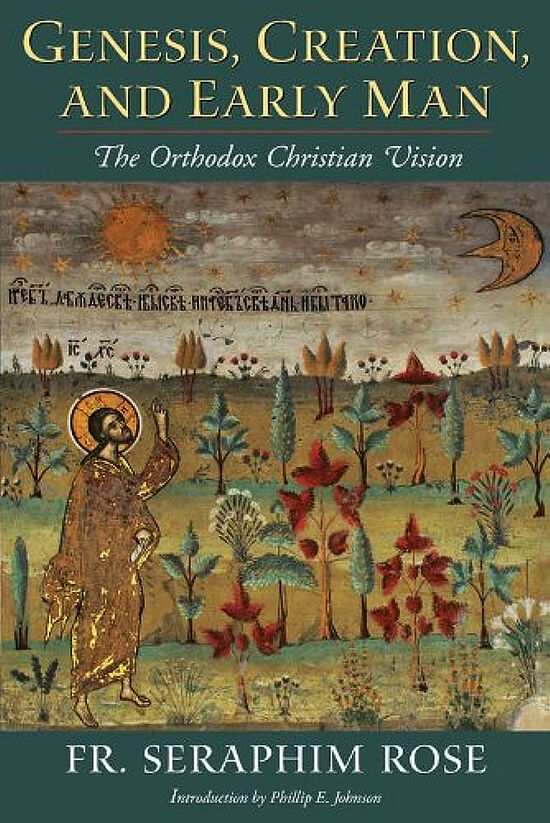 Fr. Seraphim's monumental work, Genesis, Creation, and Early Man
Fr. Seraphim's monumental work, Genesis, Creation, and Early Man
In order to humbly align ourselves with the Orthodox truth, Fr. Seraphim of course proposes that we adhere to the Patristic interpretations of Genesis, for “there is no problem of our confused times which cannot find its solution by a careful and reverent reading of the Holy Fathers.”[49] Fr. Seraphim understood the wisdom of the Church to be the summit of all knowledge and thus an illumination for all of life. He lays out a wide range of sources that he will use in his presentation, including the homilies on Genesis of the Archbishop of Constantinople St. John Chrysostom (347–407) and the hymnographer and theologian St. Ephraim the Syrian (c. 306-379); the Hexaemerons of St. Basil the Great and St. Ambrose of Milan; St. Basil’s On the Origin of Man;[50] St. Gregory of Nyssa (c. 335–384), the noted opponent of the later Arians’ On the Making of Man; the great theologian and defender of the icons St. John Damascene’s (c. 676-749) On the Orthodox Faith; the great monastic St. Symeon the New Theologian’s (949-1022) The Sin of Adam and Our Redemption; and many others. And we will compare Fr. Seraphim’s use of the Fathers with the teaching of other Fathers that he did not pull from, as well as other modern Saints and elders of whose teaching he was unaware.
It should again be noted that St. Basil’s Hexaemeron, from which Fr. Seraphim draws heavily, is generally considered to be the classic Orthodox text on the matter. Of this work his brother St. Gregory of Nyssa proclaims that “everyone treasures [it] as not being inferior to what Moses had taught,” and “there is nothing contradictory in what the saintly Basil wrote about the creation of the world since no further explanation is needed. They should suffice and alone take second place to the divinely inspired Testament.”[51] His friend, the archbishop of Constantinople, St. Gregory the Theologian (c. 329-389), offers exalted praise: “Whenever I handle his Hexaemeron, and take its words on my lips, I am brought into the presence of the Creator, and understand the words of creation, and admire the Creator more than before, using my teacher as my only means of sight.”[52] Fr. Michael Pomazansky (1888-1988), a noted theologian trained in pre-Revolutionary Russia, concurs: “His Hexaemeron stands out as a bright and exalted system which reveals the meaning of Genesis, and reigns above the former [theories] as a bird soars above the creatures which are able to move only along the earth.”[53] It is with such an attitude of reverence that Fr. Seraphim approaches St. Basil’s work, and that of the other great Fathers from whom he draws. It should also be noted that in prayerfully seeking for the mind of the Church, Fr. Seraphim prayed to the Holy Fathers and came to feel especially close to St. Basil.[54]
Fr. Seraphim pinpoints the fundamental issue for the Creation/evolution discussion: how literally ought we to read Genesis? Are symbolic interpretations mutually exclusive from a literal interpretation? The Orthodox “Creationist”[55] position of course includes the literal reading of Genesis, but in no way excludes complementary symbolic readings, whereas the evolutionist position cannot allow for the literal reading of Genesis. Of course, Orthodox evolutionists assert that God is the Creator, but the Genesis narrative cannot be harmonized with the theory of evolution if read literally, as evolutionists readily admit. Fr. Seraphim provides several examples that demonstrate the general Patristic attitude. St. Basil the Great writes:
Those who do not admit the common meaning of the Scriptures … have attempted by false arguments and allegorical interpretations to bestow on the Scripture a dignity of their own imagining. But theirs is the attitude of one who considers himself wiser than the revelations of the Spirit and introduces his own ideas in pretense of an explanation. Therefore, let it be understood as it has been written.[56]
And the Fathers do not present this approach as merely hypothetical, but rather as a definitive teaching. St. Ephraim the Syrian writes that it is “impermissible” to interpret the Six Days of creation allegorically,[57] and against those who reject the plain meaning of Genesis, St. John Chrysostom exhorts: “let us pay no heed to these people, let us stop up our hearing against them, and let us believe the Divine Scripture, and following what is written in it, let us strive to preserve in our souls sound dogmas.”[58] For him, to reject the plain meaning is to disbelieve in Scripture and endanger the soul. Fr. Seraphim also provides two important examples of complementary literal and mystical interpretations. He quotes St. Macarius the Great who teaches that the Cherubim guarding Paradise with a flaming sword (Gen. 3:24) indicates that every soul has lost Paradise, and yet of the angel with the sword “we believe that in visible fashion it was indeed just as it is written.”[59] He also notes that St. Gregory the Theologian understood the tree of the knowledge of good and evil as “Contemplation,” but St. Gregory Palamas says of this:
Gregory the Theologian has called the tree of knowledge of good and evil “contemplation” … but it does not follow that what is involved is an illusion or a symbol without existence of its own. For the divine Maximus [the Confessor] also makes Moses the symbol of judgment, and Elijah the symbol of foresight! Are they too then supposed not to have really existed, but to have been invented “symbolically?”[60]
Furthermore, although St. Paul uses Sarah and Hagar allegorically in Galatians 4, there is no indication that he therefore believes that they never truly existed in history.
Other Fathers whom Fr. Seraphim did not quote here also agree. In his article, “Children in Paradise: Adam and Eve as ‘Infants’ in Irenaeus of Lyons,” M. C. Steenberg (now Bishop Irenei) (1978– ), the dean and founder of the Sts Cyril & Athanasius Institute for Orthodox Studies in San Francisco,[61] notes that St. Irenaeus of Lyons (130–202), the “spiritual grandchild” of the Apostles (he was a disciple of St. Polycarp of Smyrna [c. 69/81—c. 155/67], who was himself a disciple of St. John the Theologian) takes situations and events in the Creation account as literally as possible as a response to the Gnostic delight to allegorize and mythologize.[62] St. Methodios, the bishop of Olympus (d. c. 311) writes that it is a “precarious procedure” to deny the literal meaning of Genesis;[63] St. Cyril the Patriarch of Alexandria (c. 378-444), known as the “seal of the Fathers,” says that he who rejects the historical meaning of Scripture forfeits his ability to interpret rightly;[64] and St. Nilus the Sinaite (d. c. 430), a disciple of St. John Chrysostom known as “the Faster,” emphatically states that to draw spiritual meanings from the text in no way indicates a rejection of the historical level of the text.[65] That this attitude was pervasive throughout the entirety of the Church is evidenced by the pre-eminent western Fathers, St. Augustine (354-430), who is often misused in favor of evolution,[66] who writes that one who interprets Genesis wholly literally is “a leading and highly praiseworthy interpreter,”[67] and the English monk and varied scholar the Venerable Bede (672-735) who cautions: “But it must be carefully observed, as each one devotes his attention to the allegorical senses, how far he may have forsaken the manifest truth of history by allegorical interpretation” (emphasis added).[68] Nearer our own times, since the advent of Darwinism, St. John, the wonder-working priest of Kronstadt (1829-1908), writes: “The whole of the word of God is single, entire, indivisible truth; and if you admit that any narrative, sentence, or word is untrue, then you sin against the truth of the whole of Holy Scripture and its primordial truth, which is God Himself … everything that is said in it has either taken place or takes place.”[69] As Fr. Seraphim takes his cue from the Fathers, so the Fathers took their cue from Scripture itself which declares that God spoke to Moses, not in dark sayings and riddles but face-to-face as a friend (Num. 12:6-8),[70] and thus Moses is not simply a relater of information but he writes what he has seen in Divine vision.[71]
Interestingly, in a critical review of the first edition of Genesis, Creation, and Early Man, which acknowledges several strong points in Fr. Seraphim’s work but ultimately lends its weight towards theistic evolution, George and Elizabeth Theokritoff[72] write that “The Fathers assume that Genesis has a basis in historical fact,” and therefore “Fr. Seraphim is commendably honest in recognizing that if one believes, as he does, that we must read Genesis exactly as the Fathers did, one is committed then to a thorough-going young earth creationism,” which gives credence to the historical level of the Genesis text. Of this they state: “Fr Seraphim’s approach is fundamentally honest and his arguments usually precise and coherent.”[73] However, throughout the review the Theokritoffs attempt to demonstrate supposed contradictions in the Fathers’ interpretation of Genesis, which contradicts their admission that Fr. Seraphim is correct in discerning a consistent view in the Fathers. As we have seen, Fr. Seraphim was deeply convinced that the Holy Fathers are our proper guide to understanding God and His creation, and it is this approach with which the Theokritoffs do not fully agree. Quoting Fr. Seraphim, they write: “he seems to have supreme confidence in the precision of ‘that knowledge of the first and last things which God has revealed to His chosen people, the Orthodox Christians’ (376). It is not always easy to share this confidence.”[74] Whereas Fr. Seraphim believed that a careful reading of the Fathers in prayerful pursuit of the mind of the Fathers is our trustworthy guide for our troubled times, the Theokritoffs ask: “Are the Fathers giving us the last word—or contributing to an understanding which we must then bring to bear on problems quite foreign to them?” but as Fr. Seraphim demonstrates throughout his commentary, the theological issues that arise from theistic evolution have already been dealt with in depth by the Fathers.
In his approach Fr. Seraphim is in accord with St. Silouan, one of the greatest Saints of the twentieth century. Fr. Sophrony attests that he taught that the Scriptures, being written by the Holy Spirit, “cannot be understood through scientific research which can only provide surface aspects and details, never the substance.”[75] Dr. John Mark Reynolds, associate professor of philosophy at Biola University and an Orthodox Christian, concurs with the Theokritoffs’ initial statement: “The Fathers from the first century forward overwhelmingly took a young-earth, global-flood view,” but in harmony with Fr. Seraphim’s approach he states: “Simply discarding the views of the Fathers is not an option for any thoughtful Christian.”[76] The Theokritoffs do not in any way advocate the discarding of the Fathers, but they certainly approach them as less reliable sources than does Fr. Seraphim.

